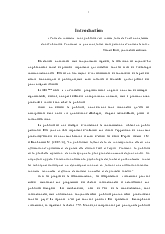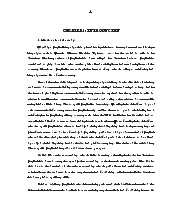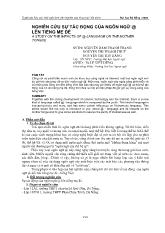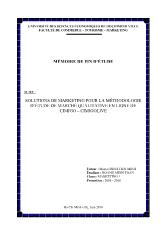The impact of extensive reading on students’ reading proficiency at university of labour and social affairs
- Người chia sẻ : vtlong
- Số trang : 50 trang
- Lượt xem : 16
- Lượt tải : 500
Các file đính kèm theo tài liệu này
 Noi%20dung%20luan%20van.doc
Noi%20dung%20luan%20van.doc
- Tất cả luận văn được sưu tầm từ nhiều nguồn, chúng tôi không chịu trách nhiệm bản quyền nếu bạn sử dụng vào mục đích thương mại
Bạn đang xem trước 20 trang tài liệu The impact of extensive reading on students’ reading proficiency at university of labour and social affairs, để xem tài liệu hoàn chỉnh bạn click vào nút DOWNLOAD LUẬN VĂN ở trên
The University of Labour and Social Affairs (ULSA) is a university which was upgraded from the College of Labour, Invalids and Social Affairs in 2005. Like other universities in Vietnam, this university is responsible for the training of skilled students to meet the demand of the society in the process of industrialization and modernization. There are faculties in the university namely Accounting, Insurance, Labour Management, and Social Affairs with about 1.200 students being trained at the moment. However, this number is increasing because of the expansion of the university.
Every year, graduates from ULSA are sent to work in various economic fields such as national and local resorts, the state and joint-venture companies, enterprises located in Hanoi as well as throughout the country. With the direction of globalization in our society nowadays, foreign languages- especially English seems to be a very important condition for them to get a job. ULSA graduates are supposed to be able to use English to communicate as well as to read materials. However, a lot of ULSA graduates miss their job opportunities because of their poor English proficiency.
Being aware of the problem posed to their students, ULSA authorities have implimented some specific innovations in order to raise the quality of training in their own context, among which is the change of teaching and learning English at the institution. These attempts can be seen in the curriculum of the school which allocates outnumber of periods for English among other school subjects and their encouragement to the English teaching staff to renovate their teaching methods. During their course at the university, students are given 330 class-hours of English ( each class-hour equals forty five minutes) of which 150 are spent on the course book Lifeline Elementary and divided equally in the first and the second semester of the first year ( each semester covers 75 class hours). In the rest 180 class hours, students must take English for Special Purposes (ESP) courses with the book ” English for Labour and Social Affairs” compiled by the English Division of the university. In this course English learning focuses mainly on reading. However, after finishing the course book Lifeline-Elementary the students still have a lot of difficulties with new words and new grammar structures which affect their learning.
Our observations and our experience of teaching English at ULSA suggested us to think that English teaching at the institution tend to focus exclusively on intensive reading, concentrating on the teaching of grammar and vocabulary in relatively short texts via post-reading exercises, often ending up demanding a translation of the passage into Vietnamese word by word with extensive use of a dictionary. The pedagogical result of this approach is that students read slowly, without a communicative purpose and they have had a passive way of learning that is students only perform what their teachers ask them to do. This results in students finding English very difficult especially when they have to deal with ESP.
Facing the problem of finding an appropriate way to help our students improve their English not only to do well in their exams but also to use it effectively when they go to work after graduating, and encouraged by researches on the benefits of extensive reading for students’ English language learning and skills development, I decided to conduct an experimental research on the topic to gain a better understanding about extensive reading and its effects on the students’ reading comprehension in the context of ULSA.




